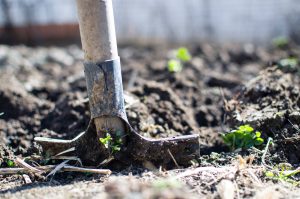Deep soil sampling reveals that compost is key to carbon sequestration
 Photo Credit: Lukas
Photo Credit: Lukas
Organic farming uses manure and compost instead of synthetic fertilizer, and new research finds that this can help mitigate climate change. Published in the journal Global Change Biology, a recent study found that using compost is critical to long-term carbon storage in deep layers of the soil. Amending soil with organic inputs like cover crops and compost is an important strategy to draw more carbon into the soil. However, this study revealed that cover cropping alone is not as useful as once thought. In fact, when the researchers sampled deep layers of soil (down to 6.5 feet), they found that conventionally managed soil amended with cover cropping alone actually lost almost 11% of its carbon. Organically managed soils amended with cover crops and compost gained nearly 13% carbon storage. The researchers suggest that compost adds important nutrients to the soil that feed the microbes responsible for stabilizing soil carbon so that it stays locked away for longer. Cover cropping provides many benefits to farming systems, and adding compost to the mix offers greater potential for mitigating climate change.

